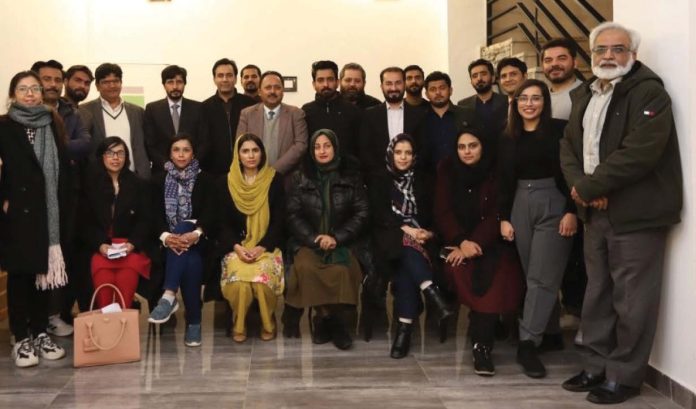ISLAMABAD, The two-day Hackathon hosted by the Institute of Urbanism (IoU) to work out best possible solutions to sustainable waste management emphasized the need to utilize waste as a resource for co-creating solutions for promoting youth-led recycling in the cities across the country.
The Hackathon organized under the program Green Urban Development (GUD) jointly initiated by Institute of Urbanism and School of Leadership Foundation with the support of the U.S. Embassy Islamabad from March 2-3 was attended by the representatives of academia, youth, researchers, media, government and private sector.
The aim of the hackathon was to find solutions to introduce at-source waste segregation at household level in cities while integrating the informal waste management stakeholders in a socially and economically just manner.
The speakers at the forum highlighted that Islamabad generates approximately 1,575 tons of municipal waste daily, whereas low recycling rate, plastic waste generated in the city is estimated to be 14.26 percent of the total waste
Moreover, there is also lack of availability of updated waste-related data to come up with the need-based waste solutions, and no policy at the national level existed which may provide a comprehensive framework for waste minimization or utilization of waste as resource.
Dr. Ejaz Ahmad, Senior Program Fellow, IoU highlighted that the informal sector is playing a critical role in recovering recyclable before waste reaches the dumpsite and the private sector is playing a role in recycling it. Yet the efforts are being carried out in silos instead of being coordinated. In addition to lack of policies, there is also lack of awareness among communities on how to sustainably deal with waste.
Ayesha Majid, Senior Program Coordinator, IoU underscored that formalizing segregation at source and recycling at community level will require focus on culturally-rooted messaging, capacity building on how to turn waste into resource, and platforms which promote partnerships among different stakeholders including the government, youth, academia, private sector and the media.
Dr. Abida Sharif, Assistant Professor, Fatima Jinnah University said awareness about waste-wise practices need to be a part of the curriculum at an early age education to promote civic sense regarding sustainable waste management. The government should also create and promote pathways to create an eco-system for waste-related initiatives and businesses.
Samia Afridi, Senior Program Manager at the School of Leadership Foundation, stated, “This Hackathon is a testament to the power of collaboration and innovation in tackling complex societal issues. By bringing together diverse stakeholders, we can harness the creativity and energy of youth to drive meaningful change in waste management practices.”
Waleed Hameed, Five Star (PVT) Ltd noted that efforts should be made to create platforms for youth to connect and learn from the existing recycling businesses. Young people and university students should also be provided seed funding and small grants to explore innovative ways to use waste as resource, he added.
Shayan Yar said that the IoU’s efforts in promoting waste based solutions in Pakistan are commendable. “What is especially amazing to see is the range of audience that IoU is able to pull in these meetings. The students, members of academia, industry leaders, entrepreneurs and practitioners are all brought together to not only exchange ideas, but also to come up with workable solutions to the problems. Such efforts need to continue if we are to see any solutions to the local waste management problems,” he said.
The 2-day Hackathon served as a catalyst for fostering collaboration and innovation in addressing Pakistan’s waste management challenges. It underscored the critical role of youth-led initiatives in promoting sustainable solutions and highlighted the urgent need for comprehensive policies and coordinated efforts across sectors.



Comments are closed.